- The Chronology
- 367 Years before the Church Agreed on what was to go into the Bible (Easter message of Athanasius)
.
The Rule of Faith rather than the Bible was the glue
holding the church together.
- Marcion - Hacked up the Church's consensus
- Montanus - Made a prophetic end run around the Church's consensus
- "Lost Books
of the Bible" Circulating
through Christendom
- Unserious Contenders
- Serious Contenders, those books that were widely--though not universally--accepted as Scripture (Didache: Teaching of the Twelve, The Epistle of Barnabas, The Shepherd of Hermas, The Gospel to the Hebrews)
- 1450 Years before the first printed Bible using movable type, enabling mass production of Bibles.
- 1600 Years before a lay person could spend a week's wage on a family Bible
- 1700 Years before Bible Societies made inexpensive Bibles affordable, but literacy was still low.
- 1800 Years before printed Bibles merged with higher literacy rates to create modern Bible Study Based Christianity
- 2000 Years before smart devices allowed the general population to hold entire libraries of Bible translations, commentaries, and Bible reference books in the palms of their hands.
- 367 Years before the Church Agreed on what was to go into the Bible (Easter message of Athanasius)
.
The Rule of Faith rather than the Bible was the glue
holding the church together.
- This Chronology Raises
this Question: Is a Highly Detailed Doctrinal Purity as important to God as it is to so many Christians, particularly Evangelicals?
- If so, why did God let His people build the Church's foundation with a mixed bag of canonical and non-canonical books? We are talking 350+ years: 14.5 generations.
- If so, why did God let Protestants reject the Septuagint (the Bible of the early church) and embrace the version of the Old Testament produced by the Jews in order to refute Christianity?
- If so, why did God let 1800 years pass before He put personal Bibles into the hands of the general population?
- If so, how could God expect a Highly Detailed Doctrinal Purity from people whose minds the Bible declares are as fallen as their hearts? Most Christians are humble about the lack of purity in their Performance, but many are as puffed up as toads about the purity of their Perception. Shouldn't we be as humble about the limits of our intellects as the other parts of our human nature?
- If so, why didn't God give us directions about when He is speaking literally, spiritually, or figuratively anywhere that we humans could confuse that? (six literal days or ages? "This IS my body"?)
- If so, why didn't God deliver the Bible in the form of a Systematic Theology so we wouldn't have as many questions or debates?
Boyd, Gregory A. & Paul R. Eddy. Across the Spectrum: Understanding Issues in Evangelical Theology. Grand Rapids: Baker House, 2002. (This is used as a textbook at many Evangelical Christian colleges & universities.) 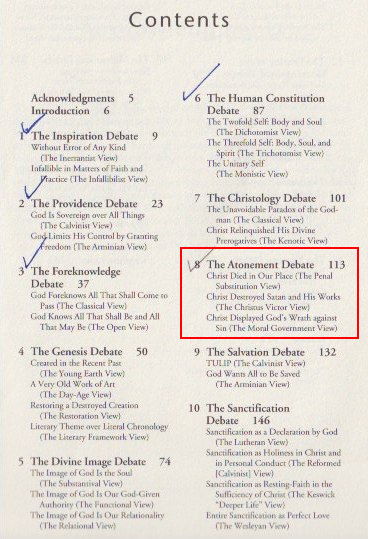
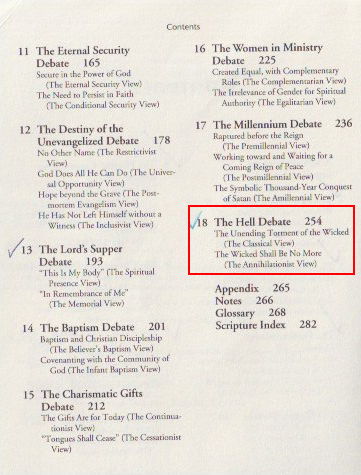
These debates do not cover alcohol usage, pacifism, political involvement, and our differences with Latin Catholicism, Other Catholicisms, and the Eastern Orthodox churches.
- If so, why did God let obscure references like a Baptism for the dead appear without any explanation?
- If so, why did God let important doctrines remain hidden for so long? (justification by faith alone, early 1500'sl eternal security, early 1500's; teetotalism, late 1700's; the Rapture, 1830's)
- If so, why didn't God protect us from possible outside contamination of the Scriptures?
- Cultural Influence - Eternity in Hell is the product of the Greek philosphers' belief in the Eternal Nature of the Soul permeating the Early Church?
- Mistranslations of Scripture - According to Eastern Orthodoxy, Christians are NOT declared righteous in any forensic sense. According to them, this whole idea arose from Jerome's mistranslation of the word δικαιωθεντες as having been justified (a Latin legal term) rather than having been made righteous (no forensic implication). The Western Church ran with that and according to the EO Church has been running amuck regarding the Atonement ever since the early 5th century; every sermon you have ever heard on God declaring you rightous in a Divine Court at the moment you received Christ is a complete delusion. (They EO Church holds to the Christus Victor / Ransom view of the Atonement; i.e., The Lion, the Witch, and the Wardrobe view)
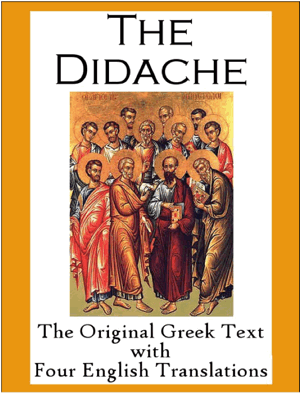 If Didache had made it into the New Testament, it would be most like the book of Proverbs in the Old Testament. There are no stories or narratives, mostly just a rephrasing of New Testament sayings by Jesus and the Apostles with some new material here and there. It was rejected for the New Testament because of its late date, not so much its content.
If Didache had made it into the New Testament, it would be most like the book of Proverbs in the Old Testament. There are no stories or narratives, mostly just a rephrasing of New Testament sayings by Jesus and the Apostles with some new material here and there. It was rejected for the New Testament because of its late date, not so much its content.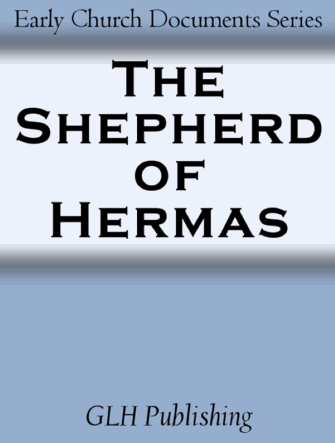
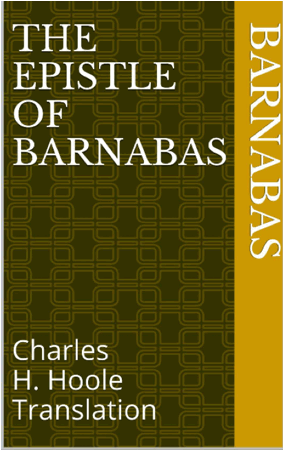 The Epistle of Barnabas
The Epistle of Barnabas
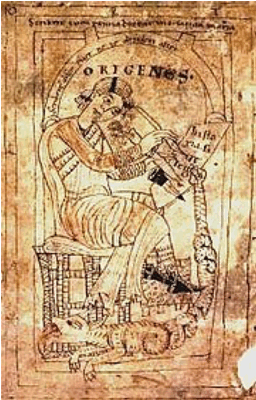 The Gospel of the Hebrews
The Gospel of the Hebrews